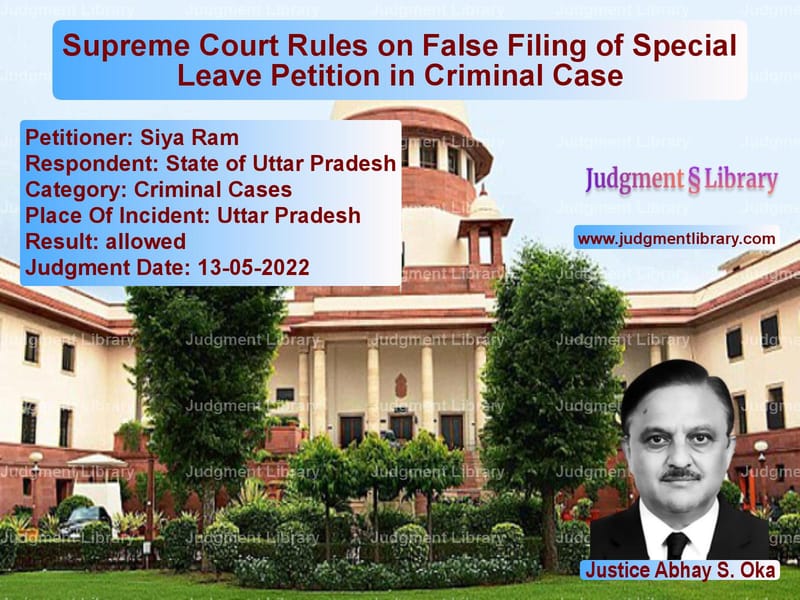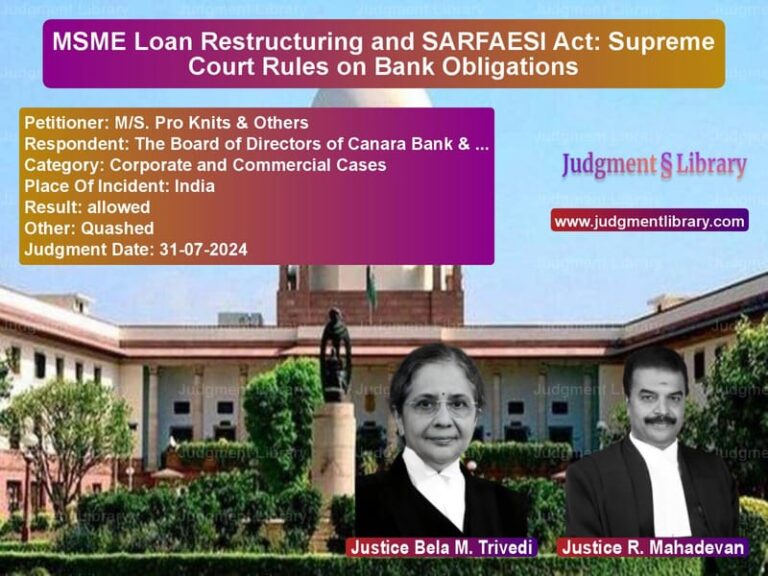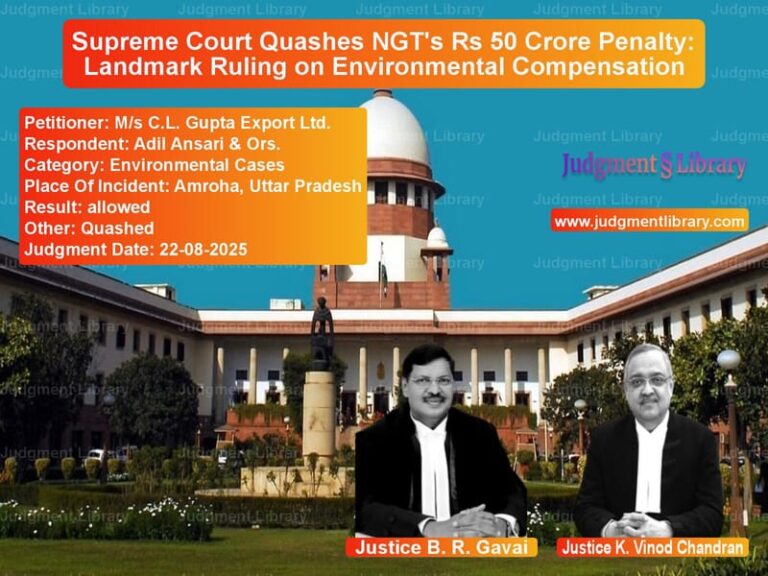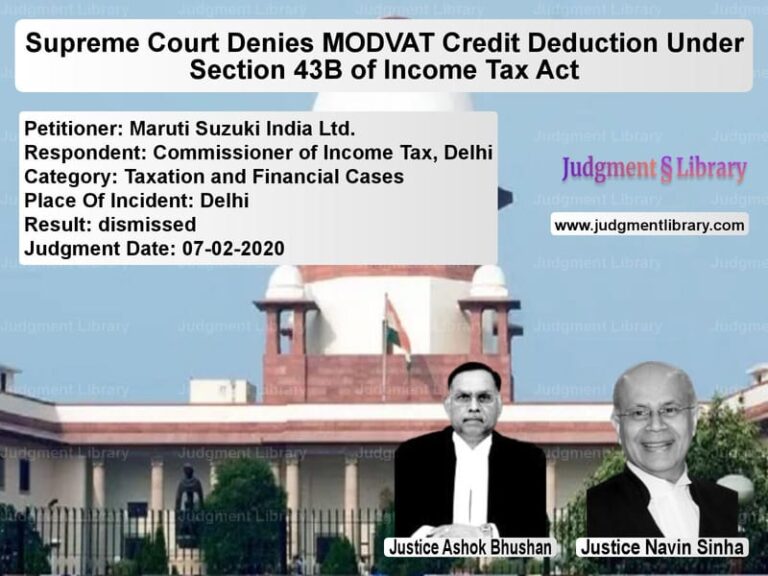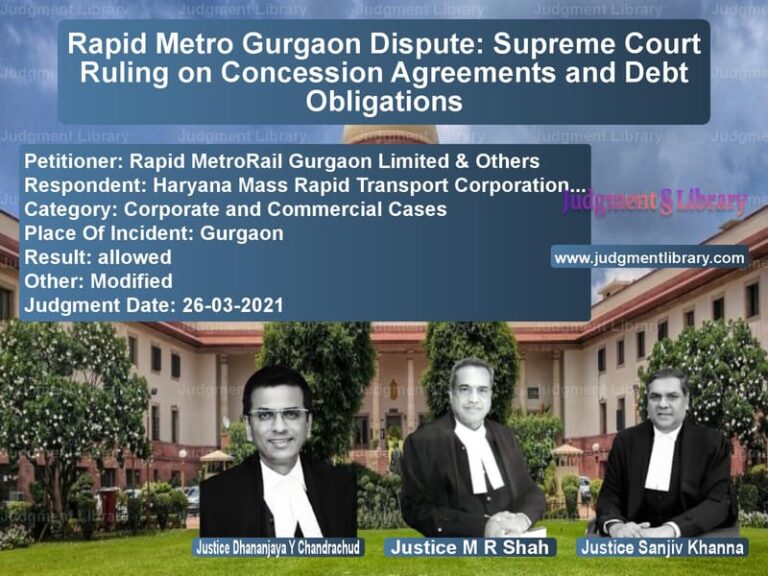Supreme Court Rules on False Filing of Special Leave Petition in Criminal Case
The case before the Supreme Court involved a criminal appeal where the petitioner, Siya Ram, claimed that he never filed a Special Leave Petition (SLP) before the Supreme Court and that his name had been fraudulently included in a petition filed by other co-accused individuals. The issue at hand was whether the SLP in Criminal Case No. 7628 of 2019 was legitimately filed on his behalf or whether there was an instance of misrepresentation or forgery.
Background of the Case
The case originated from a conviction under Section 302 read with Section 149 of the Indian Penal Code, 1860. The Sessions Court found the accused guilty of murder, but upon appeal, the High Court modified the conviction to Section 304 Part I (culpable homicide not amounting to murder), sentencing them to ten years of rigorous imprisonment and imposing a fine of Rs. 15,000 each.
The petitioners, including Siya Ram, then approached the Supreme Court through an SLP, challenging the High Court’s judgment. However, later, Siya Ram claimed that he never signed or authorized the filing of this petition.
Key Legal Issues
The main question before the Court was:
- Was Siya Ram’s name fraudulently included in the Special Leave Petition?
- Did the Advocate-on-Record (AOR) fail in verifying the identity of the petitioner?
- Should the Supreme Court recall the order dismissing the SLP as withdrawn?
Arguments Presented
Petitioner’s Arguments (Siya Ram)
- The petitioner contended that he never authorized any advocate to file an SLP on his behalf.
- Siya Ram is illiterate and only uses his thumb impression to sign legal documents.
- Upon inspecting the case file, his advocate discovered that the Vakalatnama (Power of Attorney) in the SLP contained a forged signature instead of his thumb impression.
- Since he was already in custody at the time the SLP was filed, he could not have personally visited the advocate’s office to sign the document.
- The original trial proceedings resulted in his conviction, but he never instructed anyone to file an appeal on his behalf.
Respondent’s Arguments (State of Uttar Pradesh)
- The State argued that it was the responsibility of the Advocate-on-Record to verify the authenticity of the petitioners before filing an SLP.
- They submitted an affidavit from the Jail Superintendent stating that Siya Ram had been in custody and never signed any document.
- They contended that even if the petitioner’s claim was valid, the criminal conviction should still stand and the order taking him into custody should not be nullified.
Supreme Court’s Observations
The Supreme Court conducted an inquiry into the matter and noted several key findings:
- The petitioner’s name was indeed included in the SLP without his proper authorization.
- The Advocate-on-Record failed to verify the petitioner’s identity through Aadhaar, PAN card, or other documents.
- As per the Supreme Court Rules, an Advocate-on-Record must either personally witness the signing of the Vakalatnama or verify that it was duly executed.
- The jail authorities confirmed that Siya Ram had been in custody, making it improbable that he could have visited the advocate’s office.
Key Excerpts from the Judgment
The Supreme Court stated:
“This court has no difficulty in recalling the order if the Applicant/petitioner – Siya Ram has not filed the special leave petition and has also not authorized the filing of the same. It is, however, necessary to find out the true facts under which the Advocate-on-Record came to file the special leave petition.”
The Court further observed:
“When an Advocate-on-Record does not personally know the petitioner, it is their duty to verify the identity of the person signing the Vakalatnama through proper identification documents. Failure to do so raises serious ethical and procedural concerns.”
Final Verdict
The Supreme Court allowed the application and ruled as follows:
- The SLP No. 7628 of 2019 will be considered filed only by the second to fifth petitioners, and Siya Ram’s name will be removed from it.
- The order dismissing the SLP due to non-appearance will be recalled only with respect to Siya Ram.
- The ruling does not affect the petitioners who had legitimately filed the appeal.
- The Registry of the Supreme Court must issue a circular directing Advocates-on-Record to ensure strict compliance with identity verification procedures before filing Vakalatnamas.
The Court emphasized that the Advocate-on-Record’s failure to verify the petitioner’s identity resulted in a legal irregularity. Moving forward, it directed all Advocates-on-Record to ensure compliance with procedural requirements to prevent such instances of unauthorized representation.
Outcome: The Supreme Court ruled in favor of Siya Ram, confirming that he did not authorize the Special Leave Petition, while upholding the due process requirements for legal representation.
Petitioner Name: Siya Ram.Respondent Name: State of Uttar Pradesh.Judgment By: Justice Abhay S. Oka.Place Of Incident: Uttar Pradesh.Judgment Date: 13-05-2022.
Don’t miss out on the full details! Download the complete judgment in PDF format below and gain valuable insights instantly!
Download Judgment: siya-ram-vs-state-of-uttar-prade-supreme-court-of-india-judgment-dated-13-05-2022.pdf
Directly Download Judgment: Directly download this Judgment
See all petitions in Legal Malpractice
See all petitions in Contempt Of Court cases
See all petitions in Judgment by Abhay S. Oka
See all petitions in allowed
See all petitions in supreme court of India judgments May 2022
See all petitions in 2022 judgments
See all posts in Criminal Cases Category
See all allowed petitions in Criminal Cases Category
See all Dismissed petitions in Criminal Cases Category
See all partially allowed petitions in Criminal Cases Category

